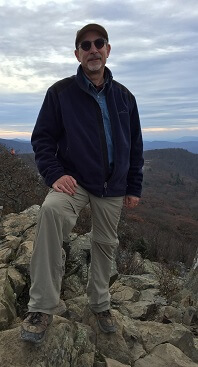
Michael Tarullo MS 2006 is currently a Software Engineer with Engility Corporation, a government contractor located in Chantilly, Virginia. Mike works at the Federal Aviation Administration’s William J. Hughes Technical Center located adjacent to the Atlantic City International Airport in Atlantic County, New Jersey. He is supporting the development of the FAA Next Generation (NextGen) Airspace Management System through his involvement with System Wide Information Management (SWIM), the FAA Service Oriented Architecture (SOA) initiative. In addition to his professional career as a Software Engineer, he has embarked on a promising career as an adjunct professor.
In his own words:
When I received my Bachelor of Arts in Geoscience from New Jersey City University in 1975 I thought I was headed for a career as a Petroleum Geologist. Because my career goal required a master’s degree in geology, I completed my master’s coursework while attending Idaho State University from 1977 to 1979. After interviewing with a major oil company, however, I decided to abort my pursuit of a career in geology. I was not sure I wanted to sit on an oil rig in South America for six months at a time without my family. In retrospect, this may have been a good decision because the oil boom went bust, and many of my classmates wound up out of work. I was quite uncertain about my future. I enrolled in a programming class at St. Peter’s College in Jersey City and soon after landed my first job as a Computer Programmer.
I programmed mainframe computers before the personal computer was invented and wrote my first programs on IBM punch cards! After working at several companies in various industries, I took a job as a computer programmer with US Life in Neptune, New Jersey. I was hired to develop and maintain mainframe programs, but an opportunity arose to join a Personal Computer development group within the company. This required a new programming language and in fact a new programming paradigm, Object Oriented Programming. Several years after I began working on personal computers, it came to my attention that Monmouth University offered a Master of Science in Software Engineering. I wanted to learn the academic foundations for the profession that had been responsible for providing my livelihood. I believe academic pursuits are important to one’s personal and professional development, even if there is no financial gain to be achieved. Knowledge itself has an intrinsic value that cannot always be expressed in monetary terms.
My company offered full tuition reimbursement, so I availed myself of the opportunity to further my education. In 2001, I began the Master of Science program in Software Engineering at Monmouth University, this after having been out of the classroom for almost twenty years. Facing a course in Discrete Mathematics as my first class, I suppose I should have been terrified, but I was quite excited about being back in an academic environment. I felt extremely fortunate that my company would pay for my education, and that Monmouth University, so close to where I lived and worked, offered exactly the curriculum in which I was interested, particularly since universities offering Software Engineering were very hard to come by. In 2006, I completed the MS degree, almost thirty years after my first graduate school experience. As luck would have it, at that time Monmouth University was seeking adjunct professors for Computer Science and Software Engineering. Since then I have taught courses in Objected Oriented Software Design, Principles of Software Engineering, and Software Testing, and I have also supervised the independent study of one Software Engineering graduate student. I greatly enjoy teaching and interacting with my students, but I also like the opportunity afforded by an academic environment to do research, if I choose to do so.
But the most interesting chapter of my relationship with Monmouth University may just be beginning. During a friendly conversation with Dean Palladino of the School of Science, I mentioned that my undergraduate degree was in geology. Not long after this, Dean Palladino asked me if I would be interested in teaching a section of the Introduction to Geology class offered for fulfillment of the general science requirement for non-science majors. After interviewing, I was invited to teach a new section of the geology course and will teach it for the first time in the Fall 2013 semester.
All these years after making the decision to end my pursuit of a geology career, I can hardly believe I will be involved in the natural sciences once again. I suppose my advice to anyone reading this is to never give up on anything worthwhile you have done in the past, particularly if you have a passion for it! This opportunity has rekindled my love for geology. This past spring, I led a short fossil collecting field trip for Dr. Claire Condie, adjunct professor at Monmouth, and several of Dr. Condie’s Introduction to Geology students. The trip visited a well-known Cretaceous collecting location near campus, one I was familiar with from my undergraduate studies. I have been busy this summer visiting various New Jersey geologic locations and collecting specimens that will be used as demonstration samples in our classes.
While in the past my family and the pursuit of my master’s in Software Engineering have kept me quite busy, my wife Maria and I are looking forward to traveling extensively in the United States and internationally now that our twin sons have completed college and are both starting their careers. Our son Matthew just received his PharmD degree from Temple University and will be starting his career as a Pharmacist at CVS. David graduated from West Virginia University in 2010 with a Bachelor of Science degree in Physical and Health Education and will be starting his teaching career with the Westfield School District this coming September. In addition to traveling, I am looking forward to spending my time reading, hiking, and in the classroom with Monmouth students.

